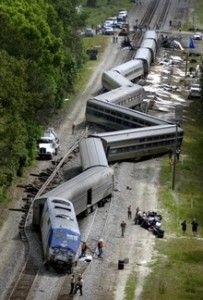End game on bullet train: No $, no project — and no prospects for $
by Chris Reed | November 26, 2013 6:00 am
 Sacramento Superior Court Judge Michael Kenny’s issued a double-whammy ruling[1] Monday. He barred the use of bond funds for the state bullet-train project until it had adequate funding and complete environmental reviews for its first 300-mile segment. He also blocked the already-authorized sale of $8.6 billion in rail bonds until they had proper vetting by a state committee that is supposed to assess whether issuance of the bonds was “reasonable and necessary,” not the incredibly cursory review that they got.
Sacramento Superior Court Judge Michael Kenny’s issued a double-whammy ruling[1] Monday. He barred the use of bond funds for the state bullet-train project until it had adequate funding and complete environmental reviews for its first 300-mile segment. He also blocked the already-authorized sale of $8.6 billion in rail bonds until they had proper vetting by a state committee that is supposed to assess whether issuance of the bonds was “reasonable and necessary,” not the incredibly cursory review that they got.
The first ruling was predictable, unless you were one of those who wondered whether Kenny “had the [deleted]”[2] to make the logical follow-through on his Aug. 16 ruling that the project’s business plan was illegal. The second ruling was a jaw-dropper, in that the government “bond validation” process is usually so pro forma. Sharp insider types I heard from Monday said they literally could not remember any government bond anywhere in the U.S. being thwarted this way.
But even though the Associated Press account of Kenny’s decisions[3] made it seem possible that the project could be back on track with “months,” it’s just not so.
The completion of environmental reviews is hugely daunting. As pointed out by Michael J. Brady, the attorney for Kings County and other plaintiffs, “It’s taken [the state five years to get environmental clearance for] 28 miles, so how long will it take them to do 300 miles?”
Unfortunately, there could be shenanigans that cleared the way for the approvals, such as state and federal exemptions.
The money can’t be funny: $25 billion shortfall not finessable
But the funding shortfall can’t be finessed. The state began with a $9.95 billion in bond seed money from 2008’s Proposition 1A. Then it got $3.4 billion in federal funds from the Obama administration. Since then, it’s either spent or committed to spend about $7 billion of those funds. The $6 billion or so left is $25 billion short of what the state estimates the first segment will cost to build.
Judge Kenny ruled Aug. 16 that state law required the state to have solid financing in place before construction could begin. He reaffirmed that view Monday. And in between, in a peculiar state filing, Attorney General Kamala Harris didn’t disagree, offering a “remedies” brief that offered no remedies[4] for the project’s financial deficiencies.
So as a practical matter, we have a project that doesn’t have a legal funding plan, and it’s not just a rogue judge who thinks so, it’s the state’s top law-enforcement official — someone who backs the bullet train and has for years.
 But can it have a legal funding plan?
But can it have a legal funding plan?
Theoretically, sure. But realistically, I don’t see how, and I don’t just say that as a project hater. Consider the possibilities:
— The congressional spigot has been turned off. In the sequester era, domestic discretionary funding is squeezed to the max[5]. And another point that is rarely made is that it’s not just House Republicans who want federal funds for California’s bullet train eliminated. It’s also Senate Budget Chairwoman Patty Murray, D-Wash., who has fought to end this Golden State pork for years[6].
— The state doesn’t have the money for the project. Cheerful Mac Taylor[7] may choose to simply ignore the state’s pension and retiree health-care obligations in evaluating the state’s finances, but not everyone is that obtuse.
— Private investors aren’t forthcoming. As the very first business plan for the project noted, they expected the state government to share their investment risk. But that’s not legal under Prop. 1A[8], because it amounts to a guarantee of a subsidy if revenue falls short.
So who could come to rescue? Maybe the real Big Red
So how could the initial operating segment be built? I don’t see anything that’s got even a 0.5 percent chance — except for The Beijing Scenario.
Three years ago, Gov. Arnold Schwarzenegger acted as if it were a realistic possibility that China might want to help pay for California’s bullet-train project, and this Bloomberg News article went along with his premise[9]. In discussions with a New York Times reporter, Chinese authorities seemed to encourage Arnold[10].
It never came to pass. But the buzz as to why Beijing might want to play sugar daddy to a cute U.S. chick was entertaining and faintly plausible.
 Having the United States’ economic archenemy help build a huge, futuristic project in the richest, most populous and most famous U.S. state could be a gigantic image and public-relations windfall for China. It could make China look potent and high-tech and the U.S. impotent and pathetic.
Having the United States’ economic archenemy help build a huge, futuristic project in the richest, most populous and most famous U.S. state could be a gigantic image and public-relations windfall for China. It could make China look potent and high-tech and the U.S. impotent and pathetic.
But it didn’t happen in 2010 and I struggle to see any way it could happen now. For all the obvious reasons: $25 billion is a huge gift for anyone, even an economic superpower; it wouldn’t play well domestically in China, where a rising middle class would prefer the money be spent to reduce pollution and gridlock; it could backfire on PR grounds if critics portrayed it as a wealthy nation being played for a fool by an even-wealthier nation.
But there’s also this: After all the insanity[11] of the past five years from the California High-Speed Rail Authority — the lies[12], the deceit, the self-delusion[13], the braying and bluster[14] of authority board chair Dan Richard — who on Earth would want to be the authority’s partner?
Beijing is not dumb. Or at least not dumb enough to want to subsidize a project as ridiculously flawed as the California bullet train.
So join me in a toast to the demise of the dreaded state high-speed rail system. Yum. That Vanilla Coke Zero really hits the spot.
I’ll always remember where I was on Nov. 25, 2013, when I first heard that the bullet train died.
- double-whammy ruling: http://www.mercurynews.com/california-high-speed-rail/ci_24598004/high-speed-rail-financing-struck-down-by-judge
- “had the [deleted]”: http://calwatchdog.com/2013/11/07/friday-hearing-will-judge-have-the-guts-to-shut-down-bullet-train/
- account of Kenny’s decisions: http://customwire.ap.org/dynamic/stories/U/US_CALIFORNIA_HIGH_SPEED_RAIL_CAOL-?SITE=CASON&SECTION=STATE&TEMPLATE=DEFAULT&CTIME=2013-11-25-15-49-13
- offered no remedies: http://calwatchdog.com/2013/10/12/state-offers-no-remedies-for-bullet-train-plans-legal-flaws/
- squeezed to the max: http://calwatchdog.com/2013/03/10/did-the-bullet-train-die-in-sequester-fallout-maybe-hallelujah/
- for years: http://www.columbian.com/news/2011/sep/21/senate-panel-oks-limited-funds-for-high-speed-rail/
- Cheerful Mac Taylor: http://www.hjta.org/california-commentary/happy-talk
- not legal under Prop. 1A: http://www.utsandiego.com/news/2010/mar/19/bullet-train-reality-check/all/?print
- went along with his premise: http://www.bloomberg.com/news/2010-09-15/china-says-can-offer-complete-package-for-california-high-speed-trains.html
- encourage Arnold: http://www.nytimes.com/2010/04/08/business/global/08rail.html?pagewanted=all&_r=0
- all the insanity: http://www.utsandiego.com/news/2013/Apr/21/tp-bullet-train-the-insanity-escalates/
- lies: http://joshuapundit.blogspot.com/2011/11/californias-latest-insanity-bullet.html
- self-delusion: http://www.calwhine.com/now-playing-in-sacramento-jerry-browns-bullet-train-rated-ui-for-utter-insanity/1641/
- braying and bluster: http://la.curbed.com/archives/2013/03/cali_bullet_train_breaking_the_rules_losing_big_supporters.php
Source URL: https://calwatchdog.com/2013/11/26/end-game-on-bullet-train-no-no-project/